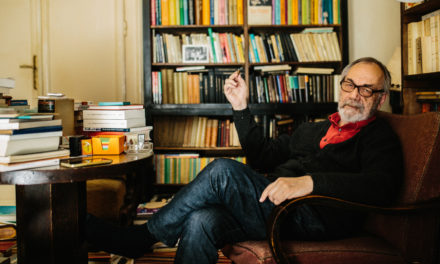Hold on, don't back down. By giving up the basic values, the essence of conservatism is also lost - warns the editor-in-chief of The European Conservative magazine. According to Alvino-Mario Fantini, the left has already occupied a large part of the university sphere and the media space, authors and opinions different from the mainstream often do not even reach the public, which is why their own media platforms, from the traditional press to the online world, are of great importance. There would be a demand for it, the newspaper The European Conservative, for example, went from a 4-page newsletter to a 112-page magazine and an independent portal. Alvino-Mario Fantini expressed his opinion on Kossuth Rádió's Sunday Newspaper program.
– What is the focus of the renewal of the magazine? Here, the new issue of the already renewed conservative Europe was presented. What was the philosophy behind the switch?
– Many things have changed, but not so much the content, I'll explain in a moment. What has changed is the distribution, the production, the design, the appearance - these are all new. The magazine itself has existed for roughly a decade, but it was always created by a team of volunteers, none of them had real design experience, they were driven by the love of work. Now, however, thanks to the cooperation and partnership with the Hungarians, we have become able to produce a magazine that looks professional, that also feels professional and is able to reach new readers all over Europe and the world. As for the content - we always focus on conservatism in an intellectual tone. We give space to various conservative, right-wing and traditionalist ideas from Europe, but also from the world. We are continuous in this, but at the same time we also want to reach new people, new authors and new sources of information. Our hope is to become a platform for conservatives, wherever they live.
- Are they able to reach a new audience in the 21st century with a printed version? century?
– We are always thinking about the printed edition, however, what is exciting is that we are strengthening the internet edition at the same time. We have always operated with a very simple website, but now we are seriously expanding it. The website was originally intended to display printed content online. Now, however, we have developed a strategy in which the website provides more timely, analytical content, more news-like things, and more analytical essays. Those who want to supplement these with the theoretical arguments behind measures and policies, those who want to understand the philosophical arguments for what they read in the online edition, will find it in the printed magazine. So it's a platform that complements each other very well.
– Are bookstores and newsagents open to selling the European Conservative?
- Yes, although there are no formalized partnerships yet, so we are not yet available in, for example, Chile or Argentina, but there are also offers from there - from research institutes, book publishers, for example - that would be willing to distribute for us. Our task now is what kind of agreements we make with these organizations. My real dream is to see the "European Conservative" across Europe, across the Atlantic, in South America, and I hope in Japan and Hong Kong.
– Do they have the opportunity to promote the paper on social media platforms, such as Facebook? Because the culture of erasure and silence has a very strong influence.
"It's very hard and very oppressive." The task of our fantastic Hungarian team is promotion and advertising on various social media platforms. So far we have been lucky and our social media presence has not been deleted or frozen. I think this is also because we are very careful with how we phrase it, and because it is a high-quality ideological paper, an intellectual magazine. We don't really use aggressive, harsh language, we try to keep a high level, civilized tone, and I think that also helps us avoid Facebook and Twitter censors.
- What can the Hungarian added value be in the conservative debates? Nowadays, Hungary is criticized a lot by the mainstream, it is classified as radical right-wing and extremist.
"It's all nonsense." I think that such things are said about Hungary only by those who either haven't been here, or don't know what they're talking about, haven't looked into the issue, haven't talked to Hungarians, and write something they've just made up. I have been visiting Hungary for 10-12 years, as a guest, to scientific events, and to work, what I see is the revival of the country, I experience the renewal of the country and the city. I see a country that is trying to rediscover its cultural, historical and spiritual roots, which is fantastic. How can anyone call this reactionary, fascist or intolerant? I just can't understand it. And what can "European Conservative" magazine learn from Hungary? A lot, because the history of Hungary is fantastic, we are talking about many centuries, Hungary and the Renaissance period, art. So much wealth to find, cultural wealth. I think every issue of the European Conservative should have an article about Hungary, because there is so much. As in Italy and Spain.
– Is it just an appearance that nowadays, and not only in Hungary or around Hungary, but worldwide and in the Western world, the fight for cultural dominance is louder and tougher? In other words, is the liberal left trying to police the mainstream more strongly? Is the battle more immersive or does it just seem that way?
– I think this battle is much more visible. I believe that more and more people are reaching their trigger point and retaliating. My view is that in the coming years we will see more and more countermeasures and resistance. Not necessarily only right-wing people, on the conservative side, but average citizens, normal everyday people who voted for Bolsonaro in Brazil or Trump in America; it's about average working people who are tired of being told that what they think or say is intolerant and not politically correct or insensitive... and it just goes on like this. The mainstream media, which can be classified as the university world, as you heard here today, is completely influenced by the progressive leftists. They have been pushing and forcing their ideas on ordinary people for so long that, as I said, I predict that there will be strong resistance, it will intensify, and this struggle will grow, and we will hear more and more public debates about them.
– Is LGBT and similar topics, such as critical race theory, just a symptom of this, or is the case itself, or a symptom of a process?
"That's an interesting point about this." I see these kinds of things as the latest manifestations of an ongoing revolutionary process that began decades ago. We can say that it started sometime with the sexual revolution of the 60s, and now it has expanded to these newer areas, such as gender, transgender, LGBT and the rest. So I see all these things as manifestations of a long-standing revolutionary process against the family, the church, order and tradition.
Author: hirado.hu
Cover photo: Facebook












